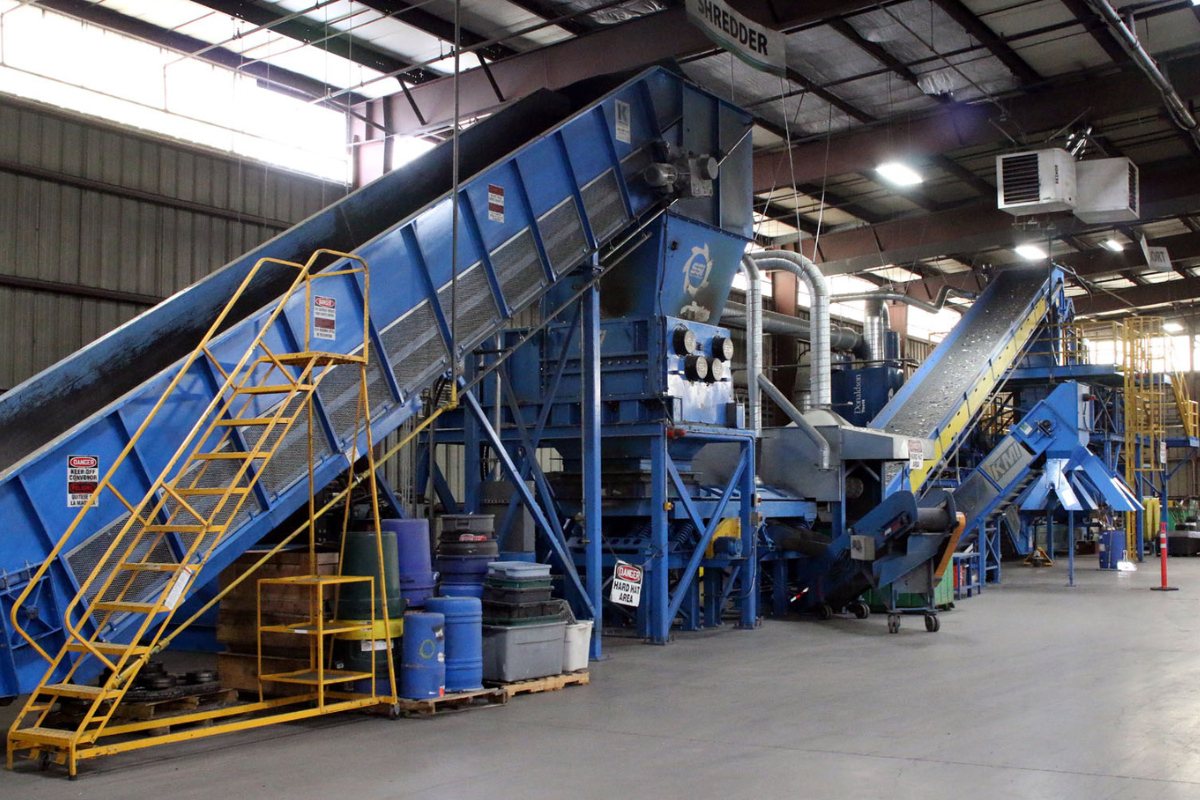
Metro Metals’ locations in Vancouver, Wash. (pictured above) and Tacoma, Wash. together handled about 41% of the e-scrap recycled by the E-Cycle Washington program in 2022. | Jared Paben/E-Scrap News
The total e-scrap weight handled by Washington state’s program dropped, one device was wrongly exported to the Middle East and a processor exited the program last year, according to an annual report.
The report, submitted by the Washington Materials Management and Financing Authority (WMMFA) to the Washington Department of Ecology, noted that e-scrap processors handled 13.31 million pounds under the E-Cycle Washington program in 2022. That was down from 14.60 million pounds in 2021, or a drop of about 13% (the numbers above include residuals not recycled).
The following are some other takeaways from the annual report:
Weights handled by each processor: As has been the case in previous years, most of the weight went to just a handful of companies. Metro Metals’ two locations in Tacoma and Vancouver together recycled 5.45 million pounds, Ace Metal Company of Mukilteo recycled 3.50 million pounds, EWC Group of Tukwila recycled 2.08 million pounds, E-Waste LLC of Lynnwood recycled 1.90 million pounds and URT’s location in Clackamas, Ore. recycled 392,000 pounds, according to the report (the numbers above include residuals not recycled).
ERI, which has a location in Sumner, Wash., recycled 222,000 pounds under the E-Cycle Washington program in 2021 but didn’t recycle any weight under the program last year, the report shows.
Learn more in person
Get up to speed on major legislative updates during the “Key Challenges Under State Electronics Recycling Laws” workshop at next month’s E-Scrap & E-Reuse Conference in New Orleans. Organized by the National Center for Electronics Recycling, the workshop takes place Monday, Sept. 18, at 1:15 p.m. Central. See the full three-day schedule and register for the event today.
Meant for recycling, sent to Middle East: The latest report also mentioned that WMMFA deployed GPS trackers in e-scrap that was dropped off at registered collection sites last year. WMMFA spent over $15,000 on the voluntary tracking activity, with the money coming from a settlement with Total Reclaim, which had illegally exported devices to Asia while it was participating in the program.
One tracker was shipped to the United Arab Emirates (UAE).
“The product containing the tracker had been sent by a registered processor to their downstream vendor for recycling,” the report notes. “The shipment of the tracker to the UAE was unauthorized by the processor. As a result, the vendor that sent the product to the UAE is no longer being used as a downstream vendor by the processor.”
Per-pound cost rises slightly: Overall, OEMs spent less on the Washington extended producer responsibility (EPR) program last year, but the cost per pound recycled increased.
Overall, electronics manufacturers cut checks totaling $4.3 million in 2022, down from $6.5 million in 2021. Total program expenses, including both program and administrative expenses, came in at $4.97 million in 2022, down from $5.37 million in 2021 (the program also carried forward nearly $915,000 in reserve funds from 2021 to 2022).
Because the program handled fewer pounds in 2022, the cost per pound rose a bit, however. Specifically, it increased to 37.3 cents per pound, up from 36.8 cents per pound in 2021, a rise of only about 1.4%.
Downstreams no longer detailed: Last year, the report disclosed a list of downstream subcontractors taking e-scrap materials under the program, but the data was omitted from the 2022 report and has since been scrubbed from the 2021 report posted on the Washington state Department of Ecology’s website. The latest report states that the details are proprietary information not included in the public annual report.
The public report still provides vague descriptions of where material ultimately goes. All of the companies list ceramic tile making as a downstream for CRT glass, and some list its use in concrete products or new glass. For plastics, Malaysia and Canada were listed as foreign downstreams, with one processor also indicating plastic stays in the U.S. Another processor shreds plastic and includes it in circuit board scrap headed to a smelter in Japan.


